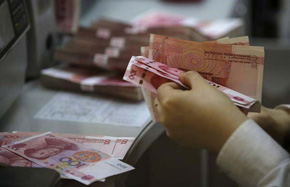CCB sets up debt-to-equity swap to reduce Yunnan Tin's leverage
 |
|
An outlet of China Construction Bank in Xuchang, Henan province. [Photo by Geng Guoqing/For China Daily] |
China Construction Bank Corp signed a nearly 5-billion-yuan ($742 million) investment agreement on a market-driven debt-for-equity swap program with Yunnan Tin Group Co Ltd on Sunday, to help the company reduce its leverage.
The 5-billion-yuan investment is part of a two-phase, five-year debt-for-equity swap program with an expected rate of return ranging from 5 percent to 15 percent. Altogether, the bank will raise social capital worth a total of 10 billion yuan for the program.
Currently, the total assets of Yunnan Tin Group exceed 50 billion yuan, and the total liabilities are 35 billion yuan. Zhang Tao, chairman of the group, said the swap aims to help the Chinese tin producer and exporter out of its present cyclical financial difficulties.
Previously, the group shifted its investment from tin production to other business segments, such as real estate, thus bringing huge capital pressure on the company. Moreover, the falling prices of nonferrous metals since the end of 2012 also tightened its capital chain, he said.
Zhang Minghe, head of CCB's debt-for-equity swap programs, said the bank hopes to help the group lower its debt-to-asset ratio by 15 percentage points from 83 percent through the 10-billion-yuan debt-for-equity swap program.
CCB will set up a fund jointly with Yunnan Tin Group to raise money for the program from the market and a small amount of the fund's original capital will come from the bank.
At present, CCB is carrying out debt-for-equity swaps by setting up funds. Like many other commercial banks, it is also seeking to set up its own investment management company.
"We'll actively apply for regulatory approval for our establishment of an investment management company," Zhang said. "Compared with commercial banks, such companies will have different skills and higher operational efficiency and will be more professional in managing investment portfolios. This will provide an opportunity for the transformation and development of commercial banks."
Analysts at Guotai Junan Securities Co Ltd said in a research note that if banks sell nonperforming loans to third-party institutions like asset management companies, it will isolate potential risks from the banks' existing business, but banks have to sell NPLs at a fairly large discount and cannot enjoy subsequent earnings after the debts are swapped for equities. However, these problems will be avoided if banks transfer bad assets to their own subsidiaries, which will increase their enthusiasm in pushing forward debt-for-equity swaps.























